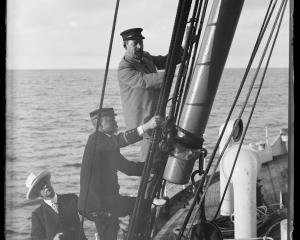
The 1996 Highlanders were in some ways the picture of how the franchise would perform for the next 25 seasons.
Plenty of excitement, a bit of dash and some good wins.
But in the end coming up short.
The first side was based on the successful Otago side of the 1990s.
The team had won the national championship in 1991 and then made the playoffs in the following years.
So the Otago Highlanders as they were known — Otago was dropped about 15 years later — had 19 players from Otago in its 31-man squad.

Many of them were very experienced Otago players.
David Latta had played more than 150 games for Otago and Stu Forster and Paul Cooke had played 100 games for the province.
Though players were amateur in the early 1990s many were basically fulltime players. Forster was the assistant groundsman at Carisbrook but simply walked across the ground once a day and that was job done. Others worked for the rugby union or a sympathetic sponsor.
But with professionalism coming fully into view, players could now leave their employment — no matter how artificial it was — and be fulltime rugby players with remuneration.
It was good money for those days — $50,000 and another $15,000 if a player turned out in three national provincial championship games.
Latta was a builder in Balclutha, and though he played just the one season with the Highlanders before retiring, he said it was no different than playing for nothing.

"The thing about getting paid was not a big thing really. You still were playing a game you loved with all your mates and that is the way it had always been," Latta said.
"There was a lot more lawyers and accountants around, so that was something a bit foreign. We were doing more training. Two or three more trainings than what you normally had."
The gym and getting bigger and more powerful became a key part of the game and Latta admitted this was completely foreign to him.
"It was the first time I had ever done any of that. A lot of the players were university students who had a bit more time than me. I was out physically working on days off and that kept me fit."
Martin Toomey was the fitness trainer for the side and said the side had evolved out of what the All Blacks and Otago had been doing in previous years.
"The guys were super fit, really. Just what had been happening in the last years of the amateur days when guys trained really hard," he said.
"Many of our side had been involved in the All Blacks the year before and that was all based around fitness and playing an expansive game.

"The younger guys were really receptive to many of the new methods. We did a lot more training and went to the gym. For some of the older guys it was tough to get used to what was now expected. But a lot of those guys who had been around for a while worked in physical jobs that keep them naturally fit."
Then there was the free gear which many took advantage of. Relations all of a sudden had new tops in the wardrobe.
The team had a few weeks in camp and the first game was at Carisbrook on a sunny early March afternoon against a powerful Queensland side, stacked with Wallabies.
The home side simply blew the team from Queensland away, winning 57-17.
Matt Cooper started that day at fullback for the Highlanders and he said one of his ambitions was met that day.
"I always wanted to play at Carisbrook and hear that Otago chant from the terraces, and be in that team. And it was great."

Cooper was one of the seven players drafted from outside the Highlanders region. Those were the days where provincial links dictated where players were picked.
The top 24 players in the region could be protected by the franchise and then those left over went into a draft where other franchises could pick them off.
Cooper did not make the Chiefs and went south to Dunedin staying with his older brother Greg’s family.
Greg Cooper had been drafted by the Blues and moved to Auckland as the Cooper family swapped islands.
Franchises directly contracting players was introduced in 2010 and that put to the end the drafting of players.
The Highlanders went on an early run and won their first three games. The side then got walloped 59-29 by Northern Transvaal — the Bulls — in Pretoria and then lost the following two games.
It then beat Natal at Carisbrook, Cooper kicking the winning goal. This game was played on a Wednesday afternoon in front of a sparse crowd.



One of the most vivid memories of the season for Cooper was being in Cape Town and hearing the news of his first born Harrison arriving way back in New Zealand.
"I was rooming with Isitolo Maka when I found out. Then Gerry Simmons and Gordy Hunter came in and got out the wine and we had a toast to Harrison. That was something I always remembered. Gordy was special like that."
Hunter was a special coach to the players and coached the side for just the one year.
The Highlanders ended up winning only two games in the last eight matches and finished eighth out of 12.
Toomey said the side probably lacked depth and suffered from injuries. It fell away and in the final game lost to the Brumbies 70-26 in Canberra, which is still its heaviest defeat.
Latta said looking back his memories were just a lot of fun and some laughs.
Cooper said he was proud to be Highlander number four and to have played in the South.
"Obviously the game has changed greatly since back then. New Zealand rugby has always had that mystique around it and been able to produce excellent players and team . . . but with the advent of professionalism the other countries have caught up. The game is a lot closer because of professionalism."
Toomey said there was a lot of laughs in 1996 and he was sure there would still be today.
"I think a lot still goes on but all of it behind closed doors. The game has changed but you are still a bunch of guys who get incredibly close together. Things are going to happen."













